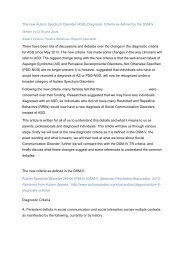Autism Speaks Special Needs Financial Planning Tool Kit
Create successful ePaper yourself
Turn your PDF publications into a flip-book with our unique Google optimized e-Paper software.
FINANCIAL PLANNING TOOL KIT<br />
The Basics of<br />
Budgeting:<br />
A Step in the Right Direction<br />
The financial aspects of caring for a child with<br />
special needs can often seem daunting or overwhelming.<br />
Even with support from local school<br />
districts or state agencies, many families pay out<br />
of pocket for expenses such as prescriptions,<br />
therapies, supplements or supplies, to name just<br />
a few. As a result, special needs families must be<br />
diligent in controlling their spending and saving for<br />
an uncertain future.<br />
While budgeting is important to all families, it is a vital<br />
component in the financial planning process for the<br />
special needs family to address the short and longterm<br />
financial needs associated with caring for their<br />
children. A comprehensive budget will identify all your<br />
resources and sources of income as well as help you<br />
gain an understanding of your monthly and annual<br />
expenses. By monitoring your expenses over time,<br />
you’ll be able to identify areas of overspending and<br />
work to reduce those expenses so that you can save<br />
and invest more.<br />
Intense consideration must be given to the budgeting<br />
process, both to meet the needs of the family as<br />
a whole, as well as developing a long term plan to<br />
provide resources in the future for your special needs<br />
child. Creating a realistic budget is the foundation of<br />
taking ownership of your financial future and can<br />
help you prepare for the road ahead.<br />
Tips to Creating and<br />
Managing Your Budget<br />
Involve the entire family: Agree on a budget up<br />
front and meet regularly to check your progress.<br />
Stay disciplined: Try to make managing your<br />
budget a part of your daily routine.<br />
28<br />
This section was prepared by Katrena Shipp,<br />
a <strong>Financial</strong> Advisor for Morgan Stanley.<br />
Katrena focuses on helping special needs<br />
families achieve financial stability. Katrena’s<br />
son is on the <strong>Autism</strong> spectrum and is a<br />
student in New York. As the mother of a<br />
child on the <strong>Autism</strong> spectrum, Katrena<br />
understands the financial challenges and the<br />
importance of planning for the future when<br />
caring for a special needs child.<br />
Choose your timing wisely, start your new budget<br />
at a time when it will be easy to follow and stick with<br />
the plan (i.e., start at the beginning of the year, as<br />
opposed to right before the holidays).<br />
Find a budgeting system that fits your needs (i.e.,<br />
budgeting software).<br />
Categorize your expenses, distinguish between<br />
expenses that are “wants” (i.e., designer shoes) and<br />
expenses that are “needs” (e.g., groceries).<br />
Build rewards into your budget (i.e., eat out every<br />
other week).<br />
Build an emergency fund: Accumulate 3 to 6<br />
months of fixed expenses as an emergency reserve.<br />
This will make it easier to address life’s inevitable<br />
surprises or emergencies and allow you to stay on<br />
track with your budget without having to utilize your<br />
credit cards.<br />
Note: Katrena Shipp’s branch of Morgan Stanley is located at One<br />
Fawcett Place, Greenwich, CT 06830.







